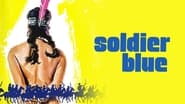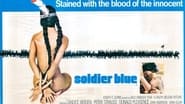Claysaba
Excellent, Without a doubt!!
Senteur
As somebody who had not heard any of this before, it became a curious phenomenon to sit and watch a film and slowly have the realities begin to click into place.
Juana
what a terribly boring film. I'm sorry but this is absolutely not deserving of best picture and will be forgotten quickly. Entertaining and engaging cinema? No. Nothing performances with flat faces and mistaking silence for subtlety.
TankGuy
Private Honus Gent and Cresta Lee are the sole survivors of a U.S cavalry platoon which was massacred by the Cheyenne. Cresta has been a prisoner of the Indians and has come to sympathise with their struggle, whereas Honus is a naïve soldier who has a robust faith in the army's Indian policy. Together they embark on an arduous journey to Fort Reunion and develop a strained love/hate relationship along the way. Despite finding it hard to accept Cresta's liberal beliefs, Honus soon finds himself falling for her. Upon reaching Fort Reunion, both of them find Colonel Iverson and his troops preparing to attack a peaceful Cheyenne village and their lives are changed forever...The "wild west" takes a chillingly bitter look at itself in Ralph Nelson's highly controversial gorefest. Firstly, I believe Soldier Blue to be one of the most definitive anti war movies due to it's shocking parallels to late 60s America. Made at the height of the Vietnam war and the peace movement when anti war sentiment was rife, Soldier Blue borrows heavily from the mindset behind both. The film is a social commentary. We have the two main characters, the radical young woman who despises war and the conservative young soldier who vows to carry pout his orders whether or not the cause is just. Then there is the military who have their own ideas on how to deal with the so called "enemy". Rooted in historical fact, the finale of Soldier Blue was inspired by one of the most disturbing and forgotten genocides in American history, the Sand Creek massacre of 1864. This atrocity was perpetrated by the Colorado Territory Militia under Colonel John Chivington, most of it's victims were defenceless women and children. The climatic battle(or should I say massacre)is probably the most horrific action sequence ever committed to film!. It's nothing more than an orgy of wanton brutality. The scene wasn't as graphic as I had thought(the region 2 DVD print seemed to be cut), but that didn't make it any less harrowing. The shots of women being beheaded, raped and mutilated and children being indiscriminately trampled and gunned down will be imprinted on my mind for years to come. Cinema-goers must have been puking into their popcorn boxes back in 1970. Furthermore, the myth behind the cavalry riding to the rescue is eternally destroyed in 5 minutes. Now the "boys in blue" were the savages, bloodthirsty sadists who indulge in mass murder. Despite the ferocious nature of this sequence, I did think some of the special effects were impressively realistic. Even more alarming is how the soldiers are laughing as they murder the Cheyenne, to them the chaos is just a bit of fun. Overall, the entire sequence itself seems to allude to the My Lai massacre. Ironically, the middle of Soldier Blue focuses on the humorous but tender affection that blossoms between Honus and Cresta before the depraved bloodbath is forced upon the viewer.The movie featured amazing performances all round. Candice Bergen nearly stole the show as Cresta but Peter Strauss was truly fantastic as Honus. His enraged disgust with the army as he powerlessly observes the carnage of the climatic atrocity was absolutely invigorating. The chemistry between himself and Bergen was also brilliantly constructed. British actor Donald Pleasence was superb as Isaac Q. Cumber(yes that's right)as was John Anderson as Colonel Iverson. The irony of his character is that he is supposed to be upholding law, order and peace but instead gets pleasure from butchering the helpless Cheyenne. The Colonel makes two speeches in the movie before and after the massacre which, thanks to the masterful writing, convey(unashamedly)the hypocrisy of war. The soundtrack was very late 60s but the film had an inspiring title song thanks to Buffy Sainte-Marie.After watching Soldier Blue I will never look at another Indians vs. cavalry western in the same way again. The movie will solely be remembered for it's nauseating climax, although amongst the severe barbarity is a profound moral statement. Some will say that Soldier Blue should never have been made, but it's a story that needed to be told and for once, I'm glad they got it right.9/10.
Zachary Jean
"No! No! Don't shoot, there's a white woman down there!" (actual line)This is another, in a long line, of movies that gives lip-service to the plight of the Native American in their movie posters (in this case by showing them all getting butchered) but fails to actually include a single Indigenous actor or get history correct. We're told that these are Cheyenne and that this is Sand Creek, but don't start looking around for Chief Black Kettle or the Arapaho because what's more important than historical accuracy is a romantic comedy between two bumbling white people.Was there ever a time when a young man, tied and bound and fighting for his life, spent more energy attempting to use his teeth to pull Candice Bergen's skirt back down over her bottom (twice) so that when he finally got around to untying her hands he wasn't confronted with (gasp!) naked female flesh? Peter Strauss plays said young man, Honus Gant, and the best you can say about Grant is that he's completely useless. In theory he is suppose to be in the U.S. Cavalry, but that implies some level of skill and instead we're treated with a neutered fop who, when he isn't flailing comically around in the underbrush, is making rude "girls are icky" remarks to Bergen, because it's the 70s and apparently audiences loved their leading men emasculated and chauvinistic in equal measures. I was born in 1970, the year this movie came out, and while I know about My Lai whatever emotional impact Ralph Nelson was able to make at the time by connecting this movie with that atrocity has long been lost. Indeed, emotionally, if you actually want to know about what happened at the Sand Creek massacre, I suggest reading, "Bury My Heart At Wounded Knee," by Dee Brown, which also came out the same year as this movie and puts Nelson to shame. But if you're more interested in watching Candice Bergen belch and do her "Ugh! Pale Face!" routine, then Soldier Blue is the movie for you!
snicewanger
Soldier Blue was another Anti US Military/Anti Viet Nam film made in the early 1970's, this time using the nineteenth century American Government's ethnic cleansing policies against the Native American Tribes of the Western Planes as a metaphor for The US Governments Southeast Asian Policy of the Viet Nam Era.The college anti war crowd had "Fallen in Love" with Native American Culture and Hollywood was looking to cash in on their new appreciation of the dark side of the winning of the American West. Soldier Blue is loosely based on the Sandcreek Massacre of 1863.The film purports to chronicle the events leading up the tragic incident as seen through the eyes of two white people. That is the big problem with the film.Other then the title song by Buffy Saint Marie there really isn't a whole lot of input from the Indians The Native Americans portrayed are still caricatures and little is revealed about their personalities and viewpoints other then they are the "Noble Savages" and are in need of the sympathetic guidance of the two racially sensitized Caucasians because they are not really sophisticated enough to understand whats going on.While the theme of the movie is certainly a laudable one, that's not enough.The script tries to be politically correct but comes off as condescending.The opening scene has Dana Elcar coming out of an outhouse which winds up being a telling image of story quality of the film itself It also is way too vague in it's historical reference. It has the Sandcreek tragedy happening in 1877 which is 14 years later then it really happened The two leads Candace Bergen as Cresta "Maribel" Lee and Peter Strauss as Honus Gent give weak performances that sink the story.Bergen was beautiful but had yet to find herself as an actress at that time and she plays her character as so smug and irritating that you hope somebody will shoot her.Strauss is totally forgettable as the whiny and unobservant Gent. Donald Pleasence gives some life to the proceedings with his characterization of Isaac Q Cumber but he is essentially playing the same sneaky, greasy bad guy he played in "Will Penny" and would play again in "Centennial".Possible SpoilerMuch has been made about the graphic attack on the Cheyenne village shown at the conclusion of Soldier Blue. It's extremely well executed...so to speak... and director Ralph Nelson did an outstanding job of visualizing the horror and the reality of the massacre and it's accurately depicted here. If the rest of Soldier Blue had been as well done as this particular episode in the movie, it would have been a classic film. As it is Soldier Blue is much more about the American political mindset of the 1970's then it is about the history of the American West in 1870's
Kieran Green
Soldier Blue chronicles the adventures of Honus (Peter Strauss) and Cresta (Candice Bergen), the only survivors of a Cheyenne Indian attack, as they journey across the wilderness of the old west in search of refuge. Donald Pleasance has a memorable but all too brief role as an eerily sleazy gun runner who encounters the pair,( witness his enormous teeth!) 'Soldier Blue' encompasses A life changing journey that reaches a tragic climax as they bare witness to the cold-blooded slaughter of the Cheyenne tribe. Reflecting the political climate of the time, Soldier Blue is uncompromising in its anti-war stance and its extremely graphic and savage depiction of the Sand Creek Massacre of 1864. It is dated albeit slightly witness the all too bright red paint like blood! but remains an incredible allegory.

















